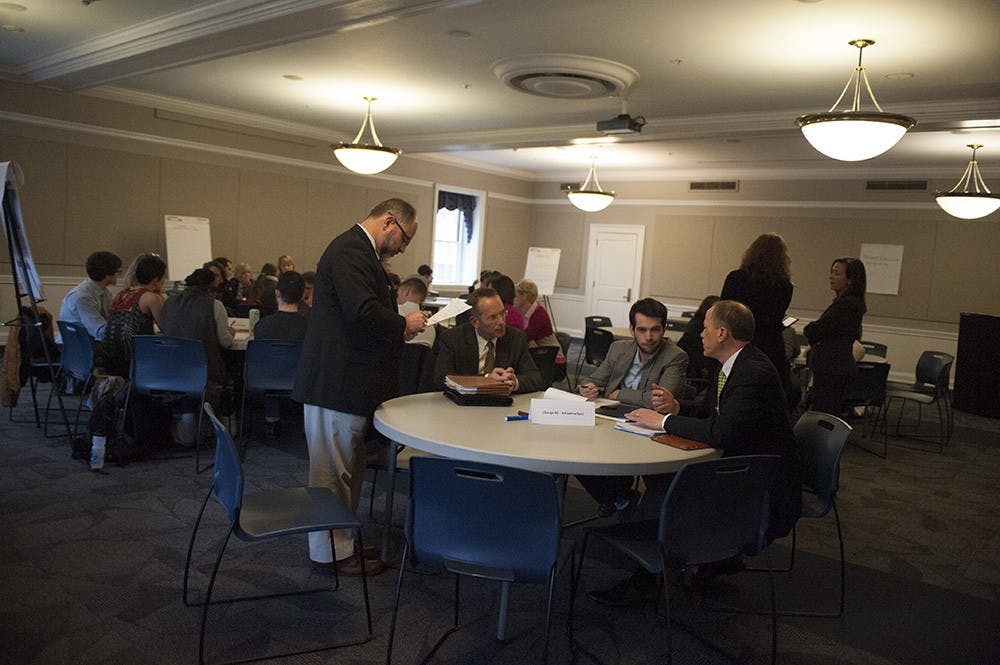The Prevention Working Group of the President’s Ad Hoc Group on University Climate and Culture held a town hall-style meeting Monday in which students, faculty and other University community members discussed ideas about how to prevent sexual violence on Grounds.
The University Climate and Culture group includes three working groups: Prevention, Response and Culture. While all of the groups work closely together, separate meetings for each group are held to facilitate deeper collaboration on issues.
“Each of these messages is so important that we wanted to focus the time and effort into the individual work groups,” Prevention Working Group Chair Bill Brady said. “There’s some degree of overlap from the mission of one work group to another, so we share and communicate.”
The purpose of the town hall meeting was to involve the University community in creating solutions to prevent sexual violence on Grounds.
Sexual assault bills in the Virginia state legislature: 2015 session
“We want you to be here and we want you to be able to express yourself, thoughts, opinions, concerns, anything that’s appropriate for the University to use,” Brady said in his address to attendees.
The Prevention Working Group outlined five charges to prevention programs — alcohol and drugs, reporting and student advocacy, admissions and infrastructure. The five different charges were represented at different tables around which attendees circulated to discuss solutions.
Under the alcohol and drug charge, participants discussed safe drinking practices and changing residence hall policies, which may indirectly encourage students to drink off-Grounds.
In discussing infrastructure, participants mentioned the role of resident advisors and how they could intervene to prevent sexual assault. The infrastructure charge also discussed how increased lighting and emergency phones could improve student safety on Grounds.
Conversations across all charges emphasized the risks first-year students face upon arrival to the University and initial exposure to University life.
“There are real risks that happen when people show up in those first six weeks,” an attendee said in the group discussion. “They don’t know the people they’re with, they don’t know the environment they’re in, they’re encouraged to do new things.”
Attendees offered different solutions to reduce first years’ vulnerability in their first weeks, such as a mentor program that matches first years with undergraduate upperclassmen, especially women.
“There is such a wealth of knowledge in the older students,” an attendee said. “Older students have so much experience and first-year women are at such a risk when they come here.”
Other solutions offered by attendees went past the scope of first-year students. Many participants emphasized the need for continued education throughout students’ careers at the University in addition to a heavy concentration of sexual assault education for first-year students.
Brady said sexual assault education needs to start at the basics, including defining “sexual violence.”
“I think some people have an idea of sexual violence as one specific act when it’s a spectrum of things that can happen,” Brady said.
Participants also highlighted how University men should be involved in sexual assault policy reform based on their willingness to see change on the cultural and administrative levels.
“Men are standing up and being passionate allies to change this situation,” an attendee said. “It’s really a time to step into that.”
Brady said the meeting provided constructive dialogue and new ideas to consider for two reports due to President Teresa Sullivan at the end of March.
“I think we heard several new things that we hadn’t considered, we heard many things we talked about before [and] we got new perspectives from things we heard before,” Brady said. “We will take all of it to heart and factor it into our consideration.”
Brady said he hoped the meetings for the other two working groups will see the same success as the Prevention Working Group.
“We met the objectives to broaden this topic and make sure the University community is represented,” Brady said.







